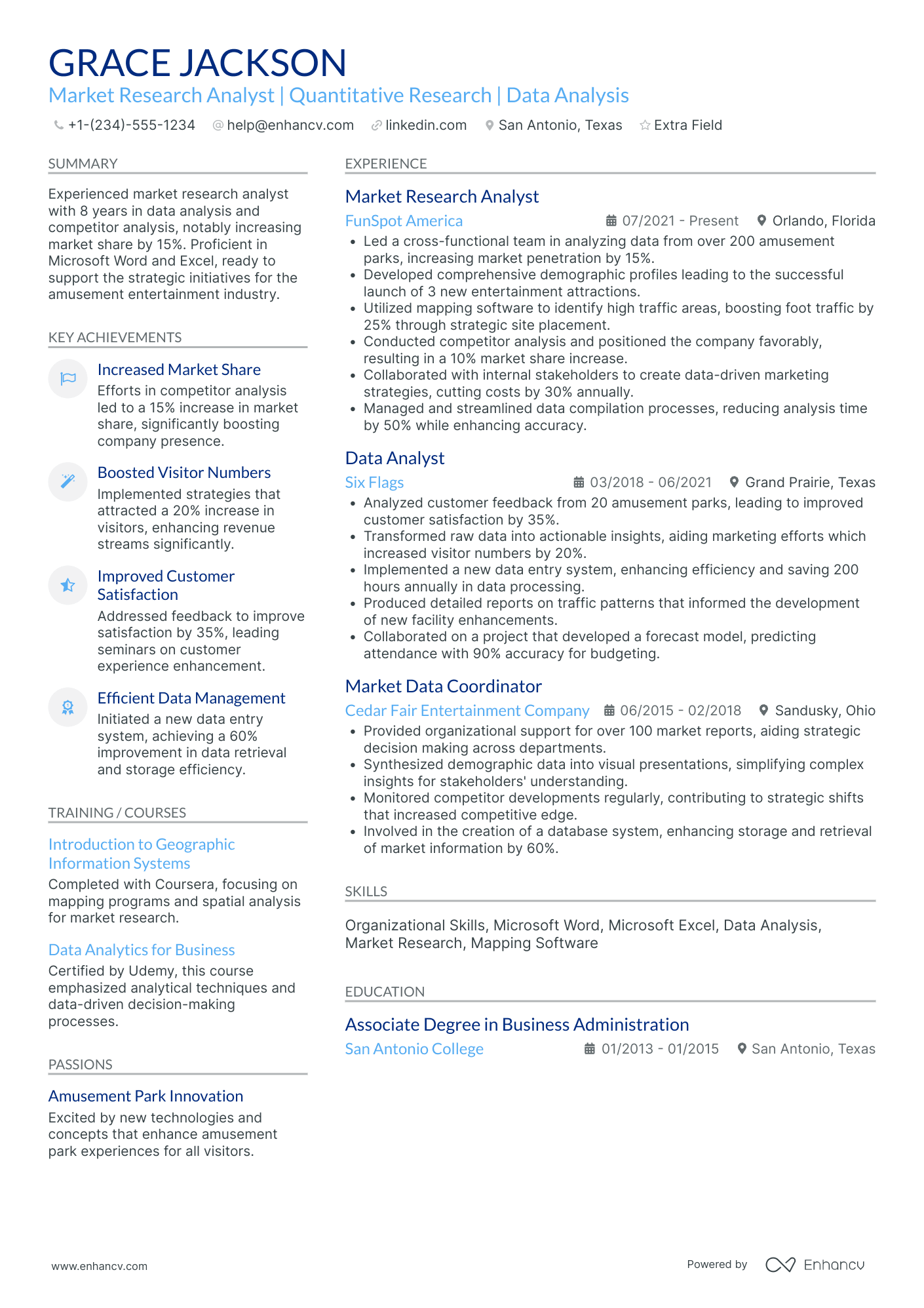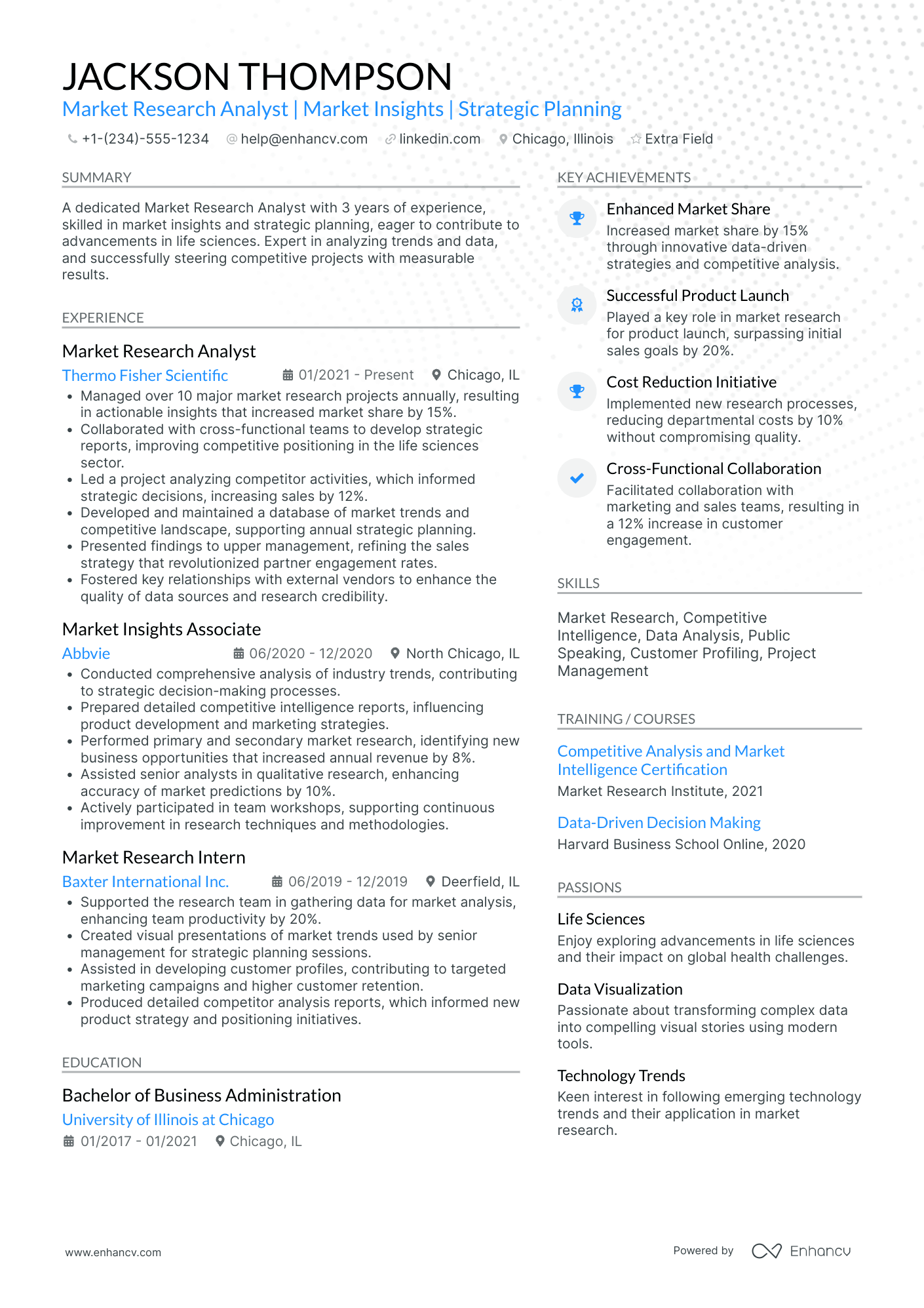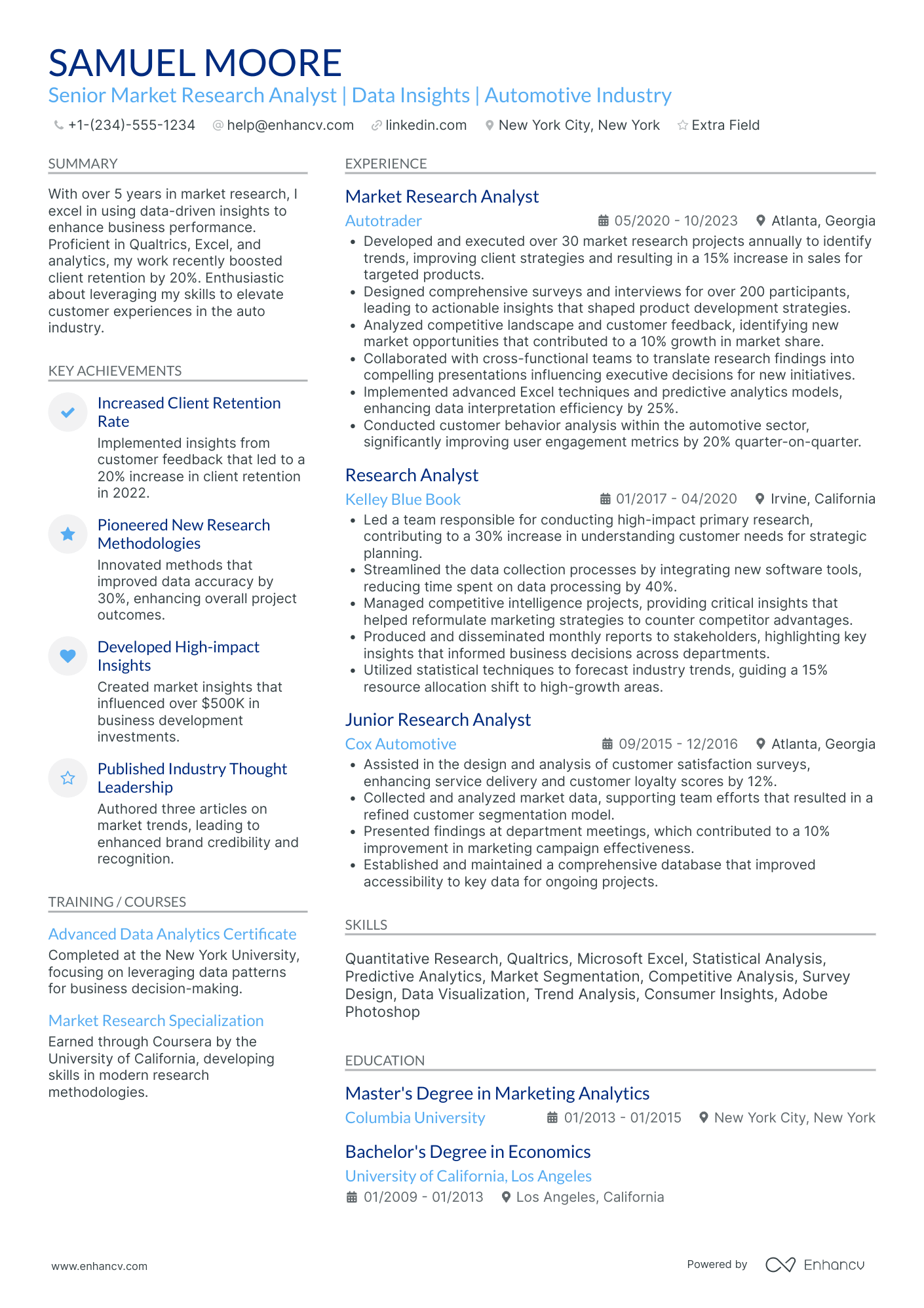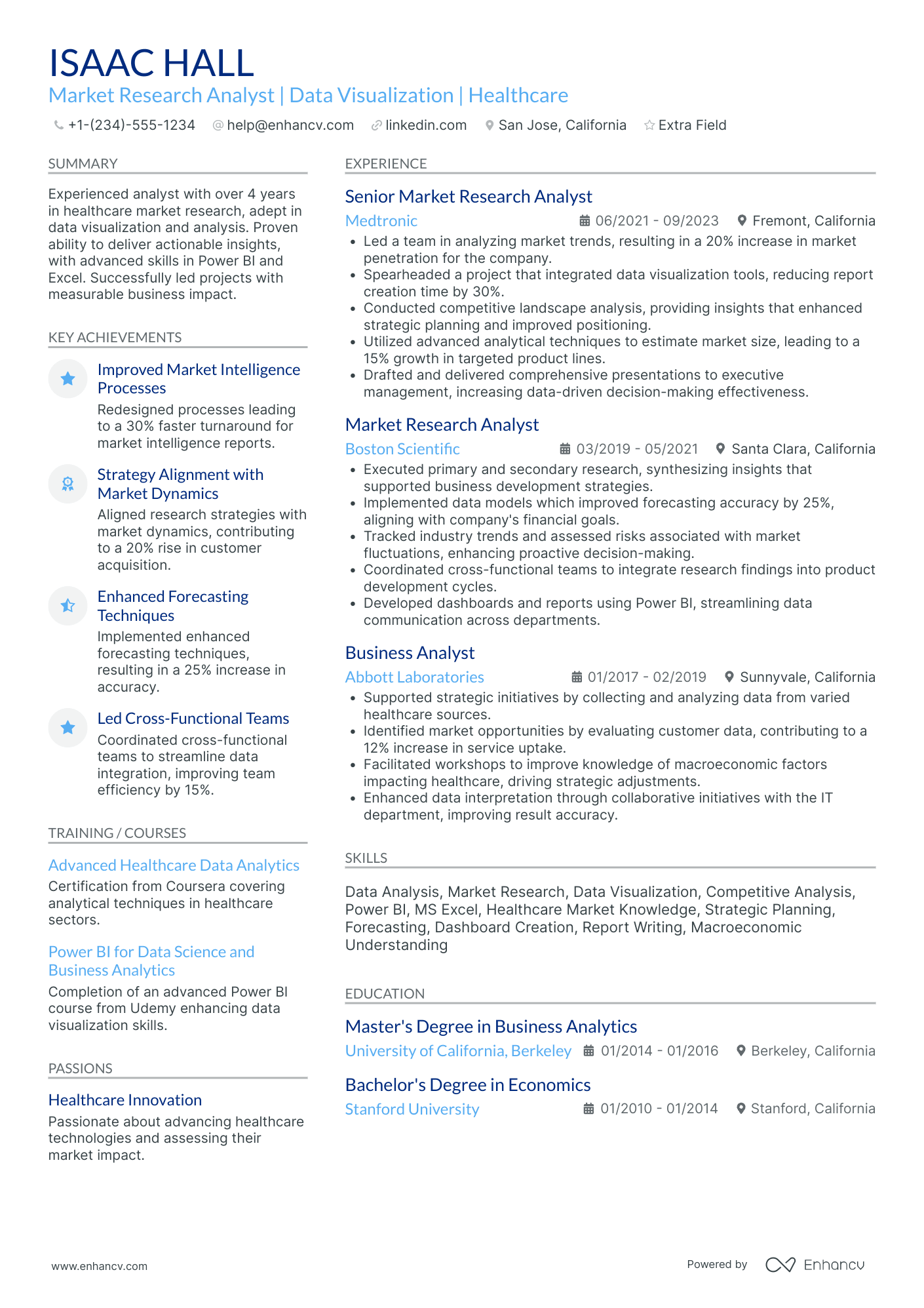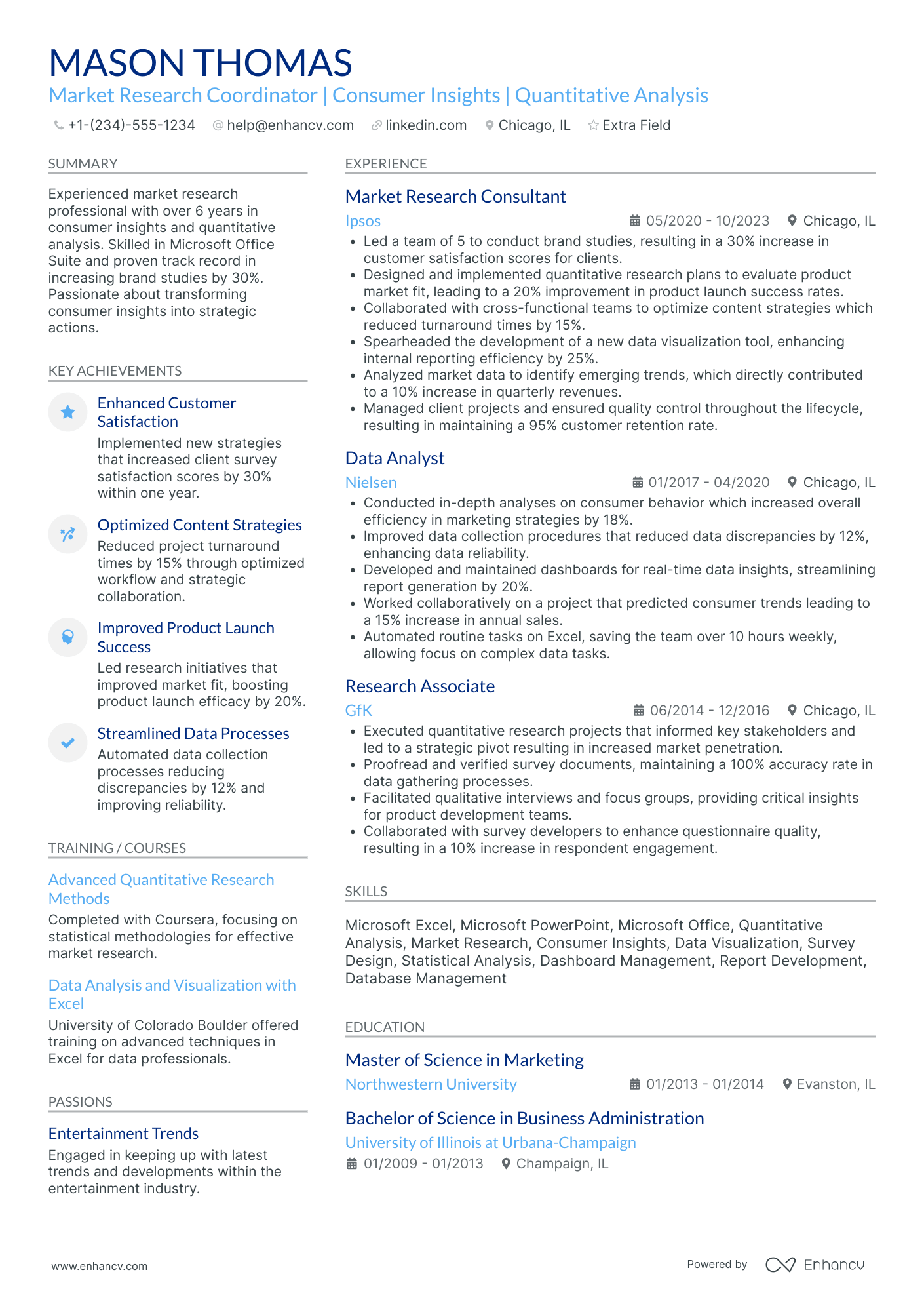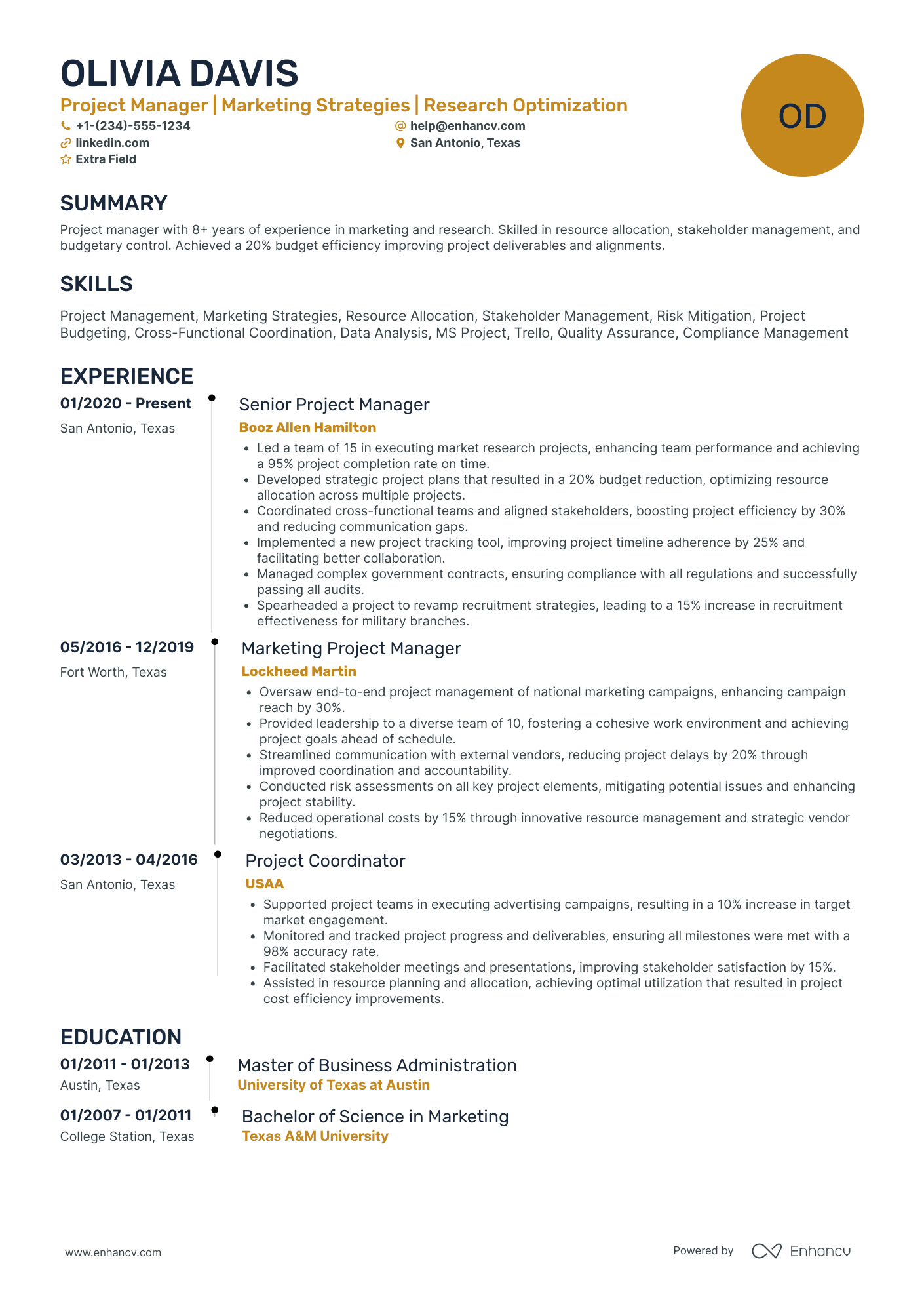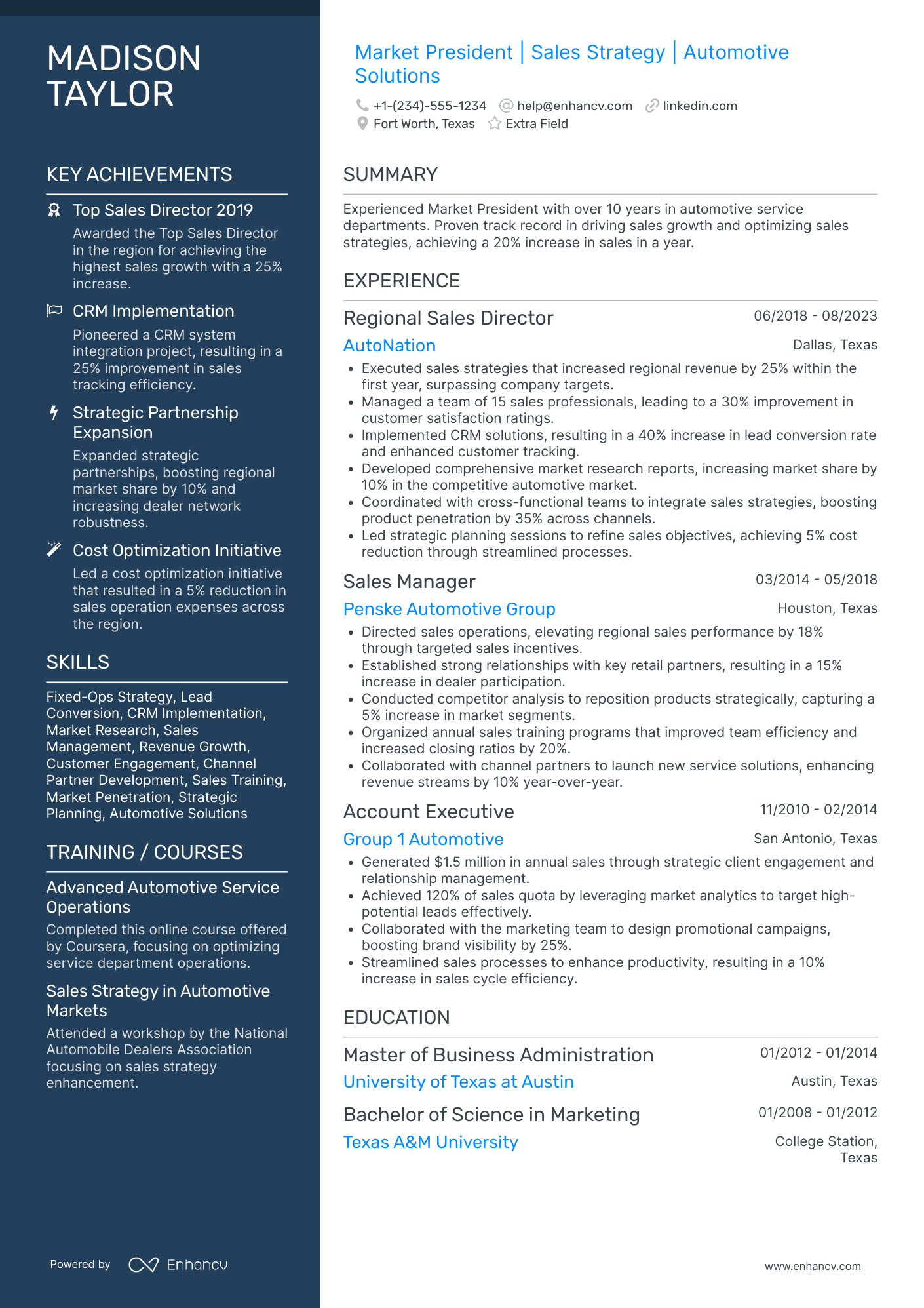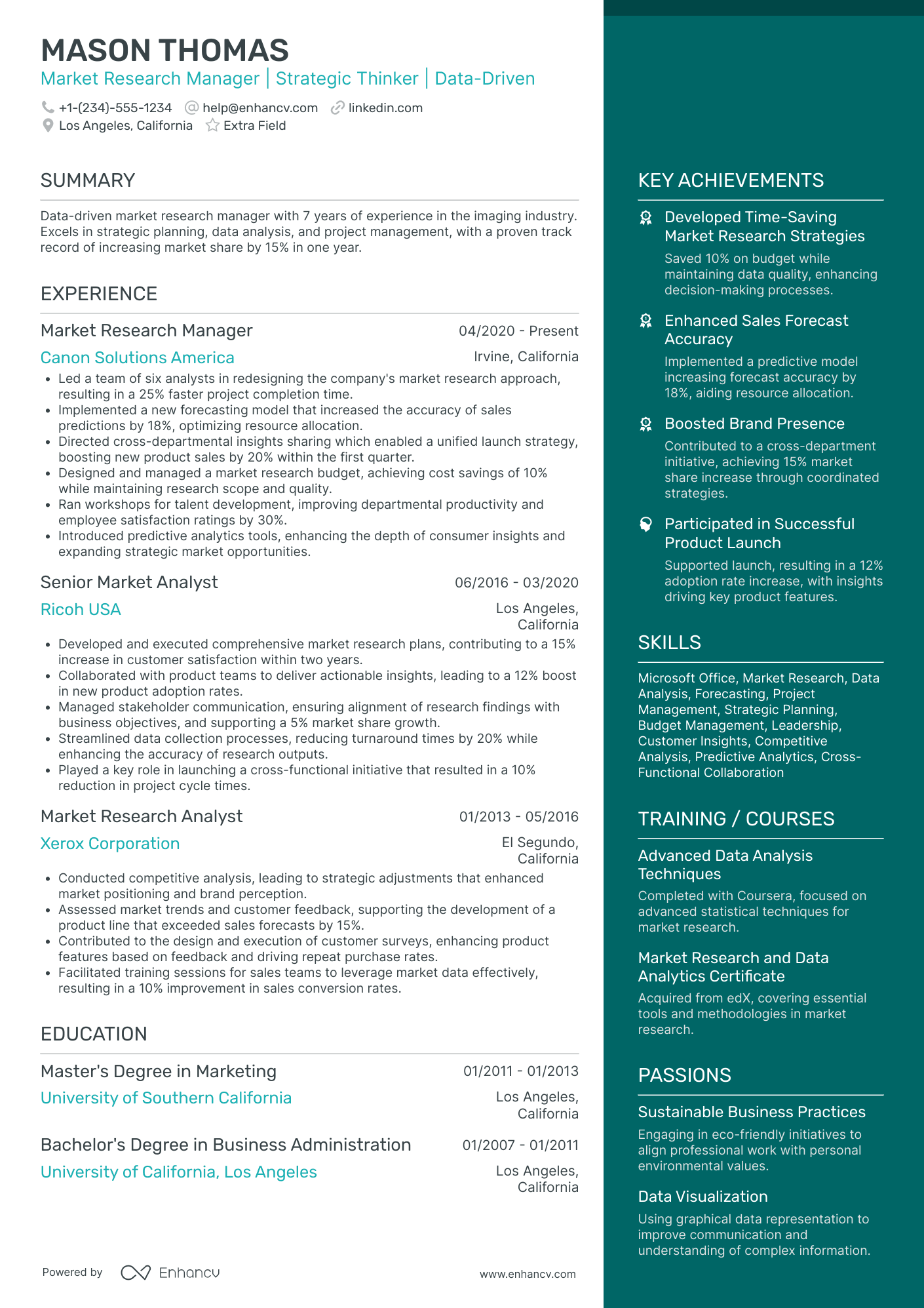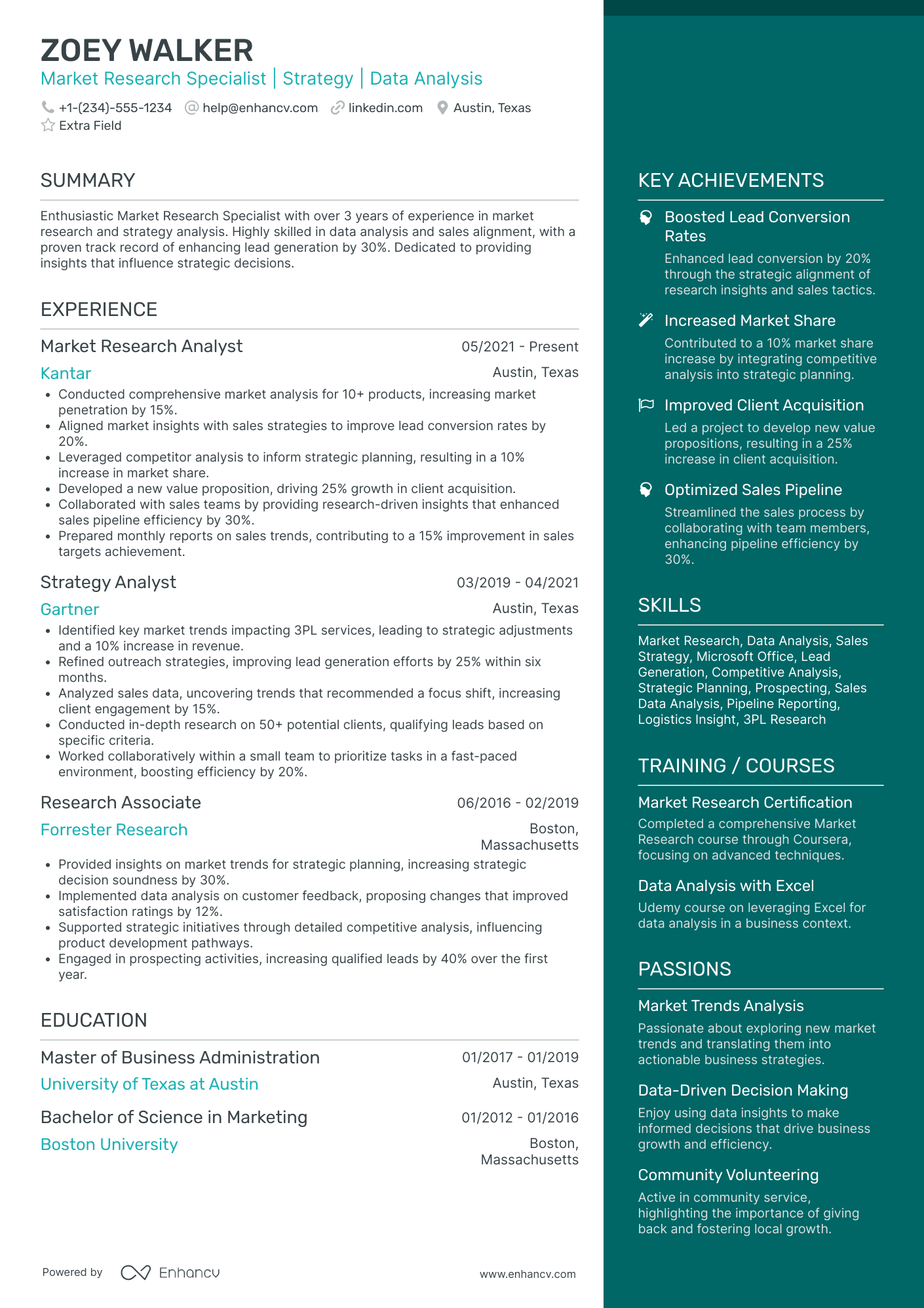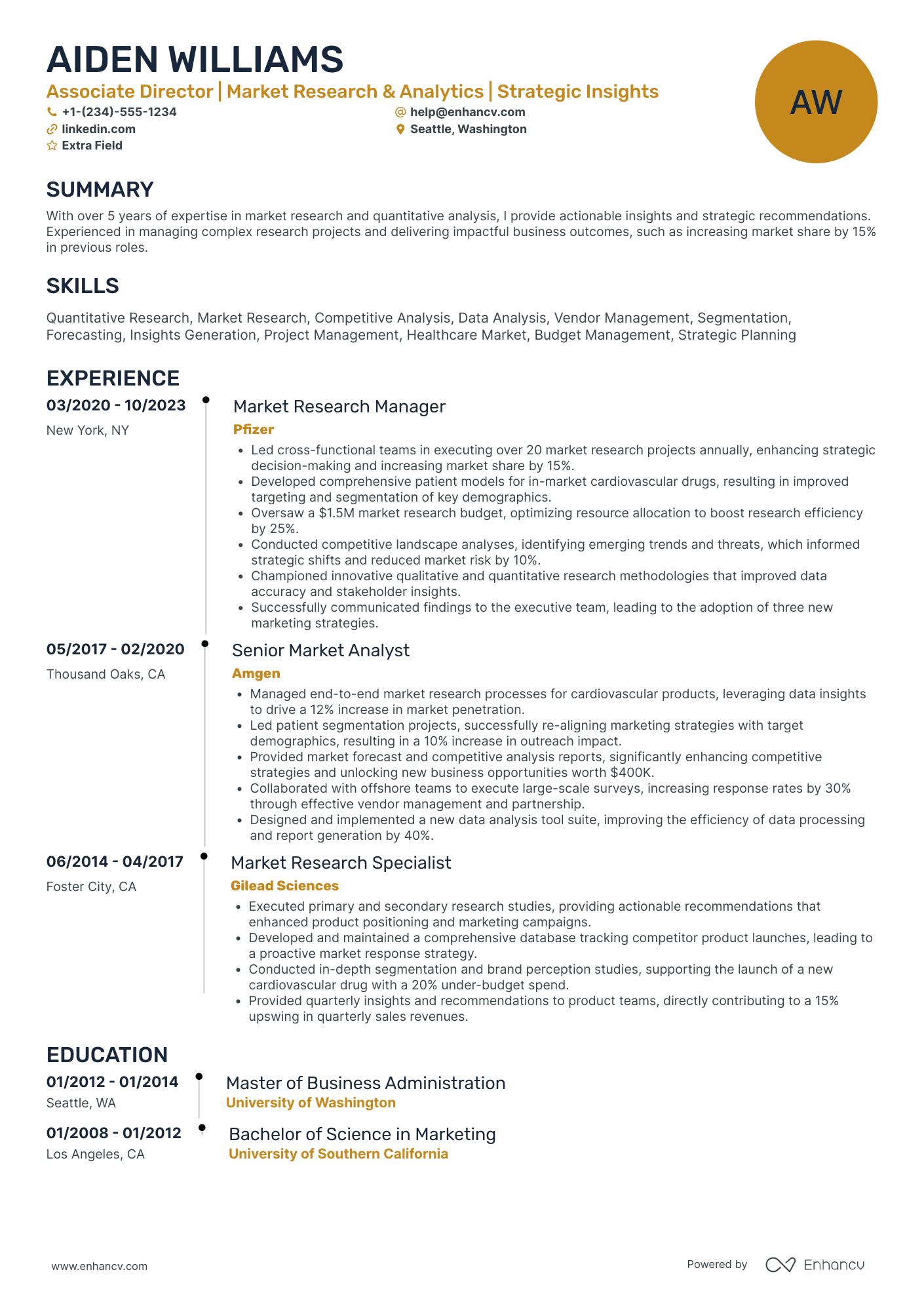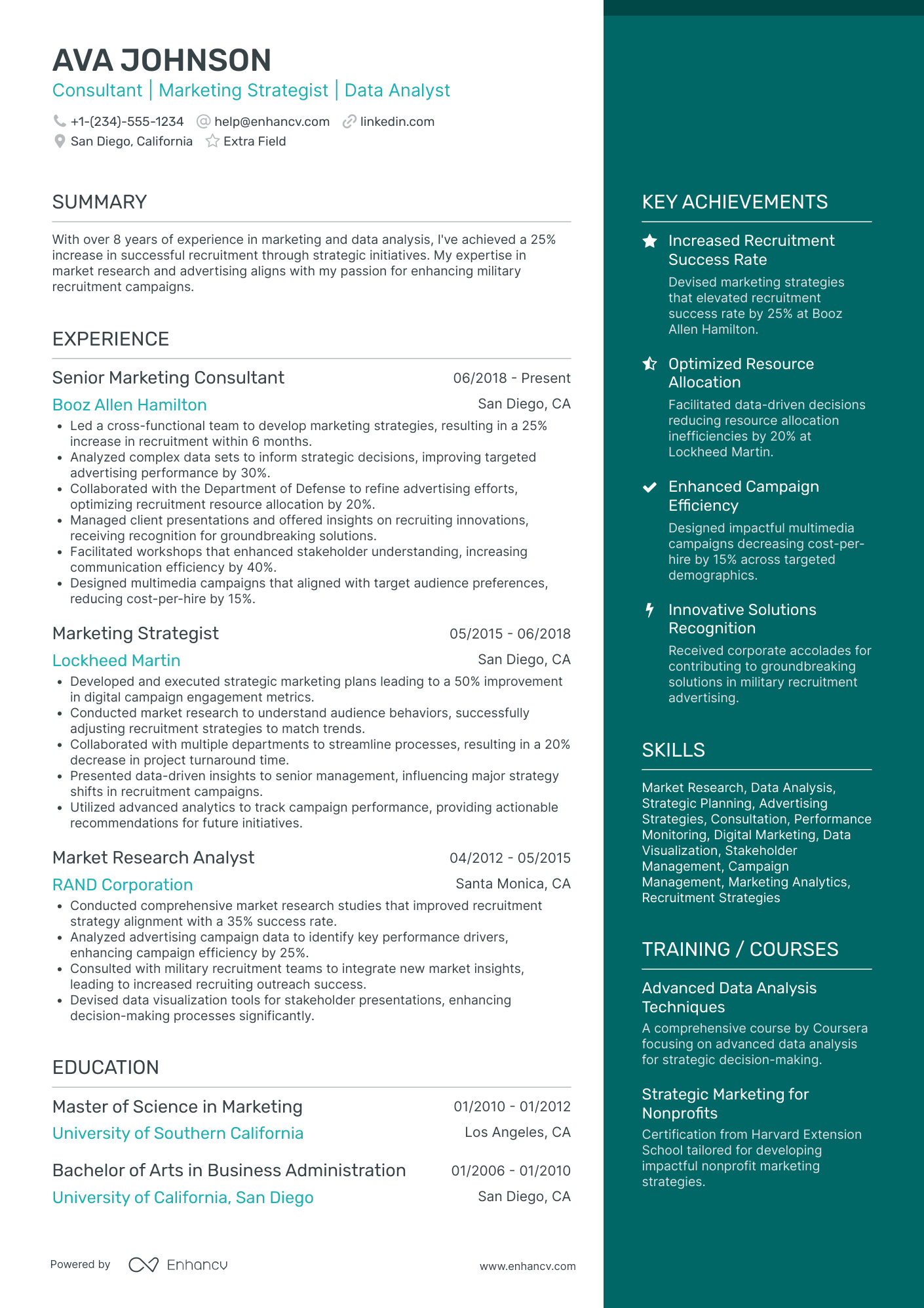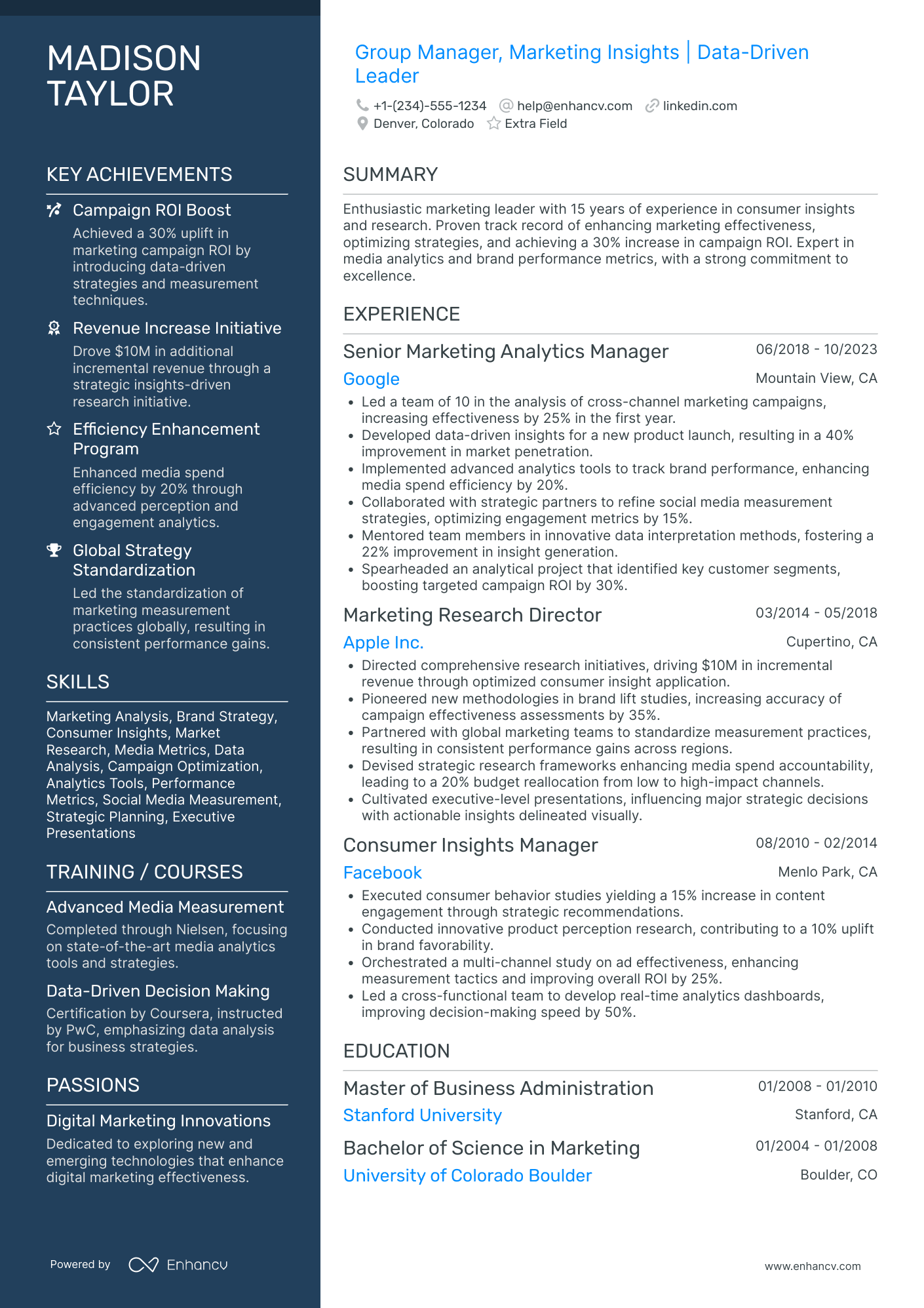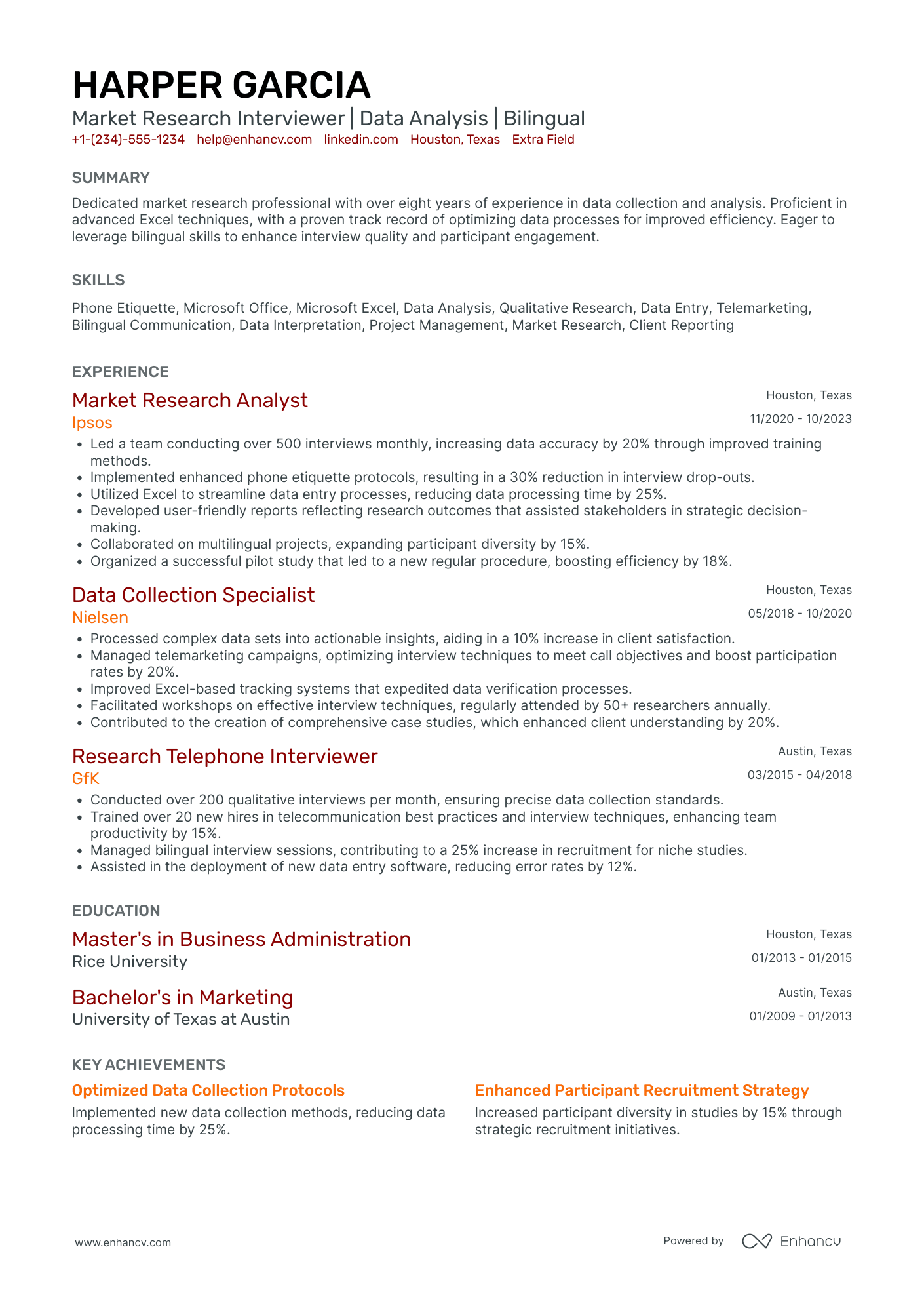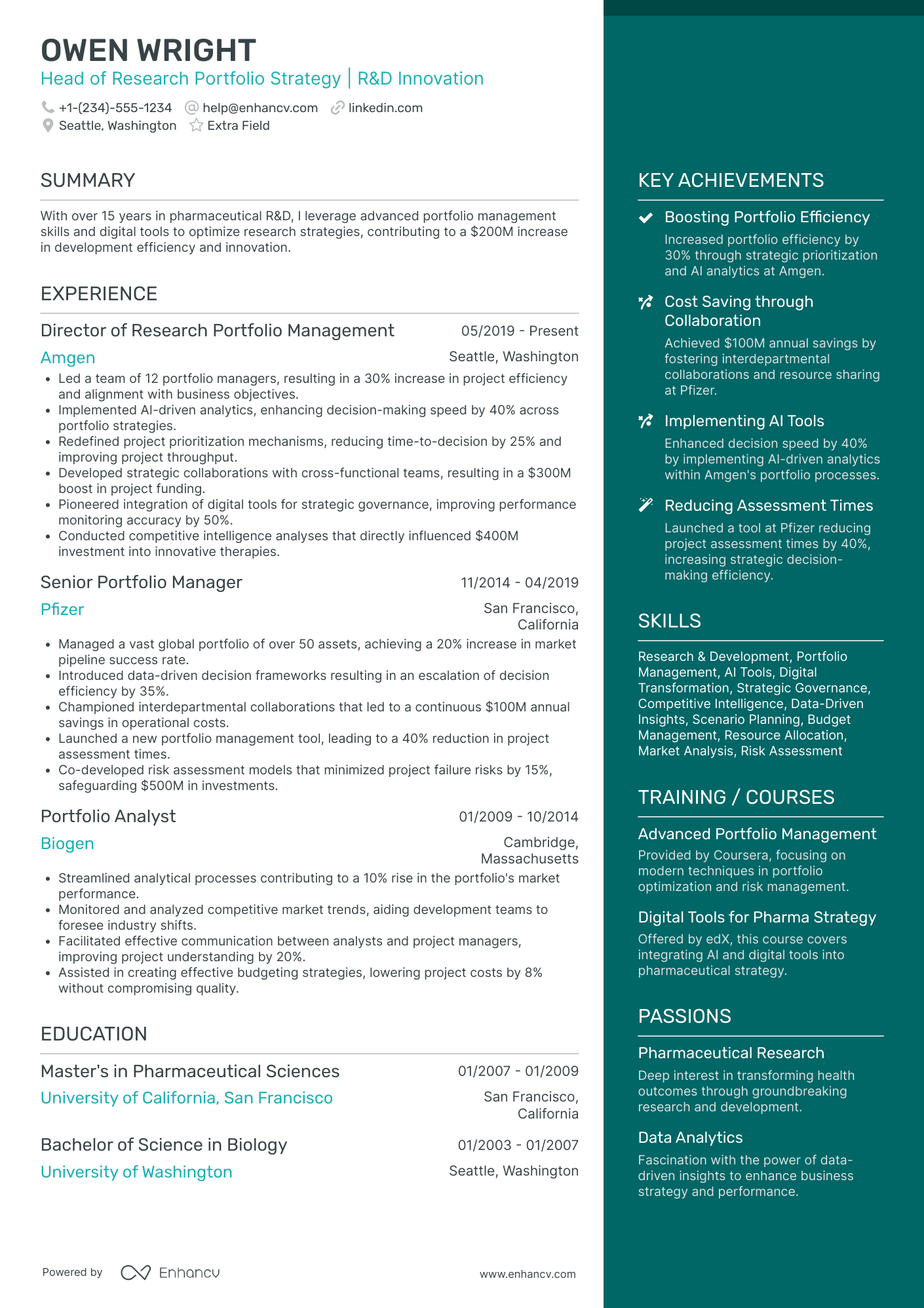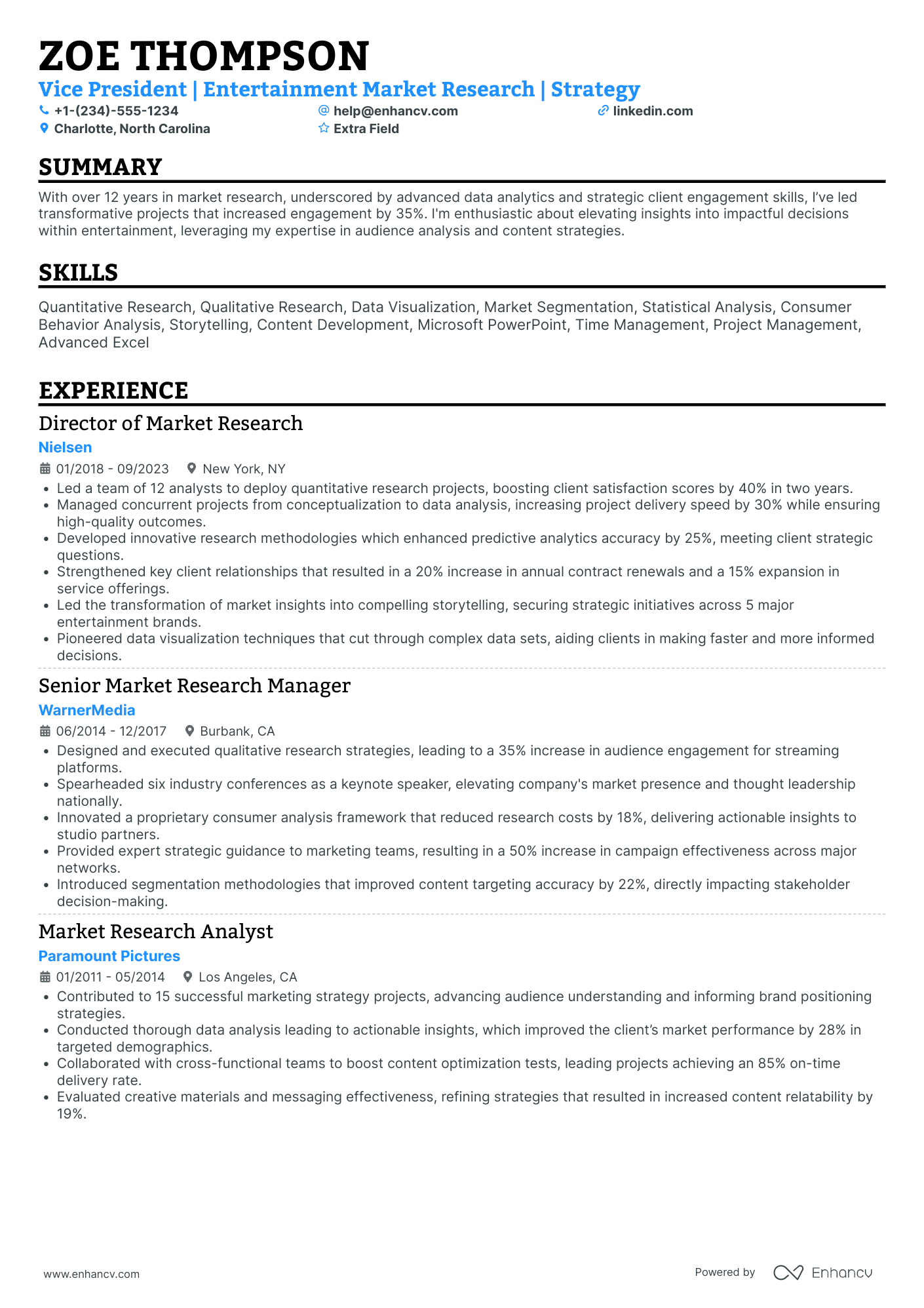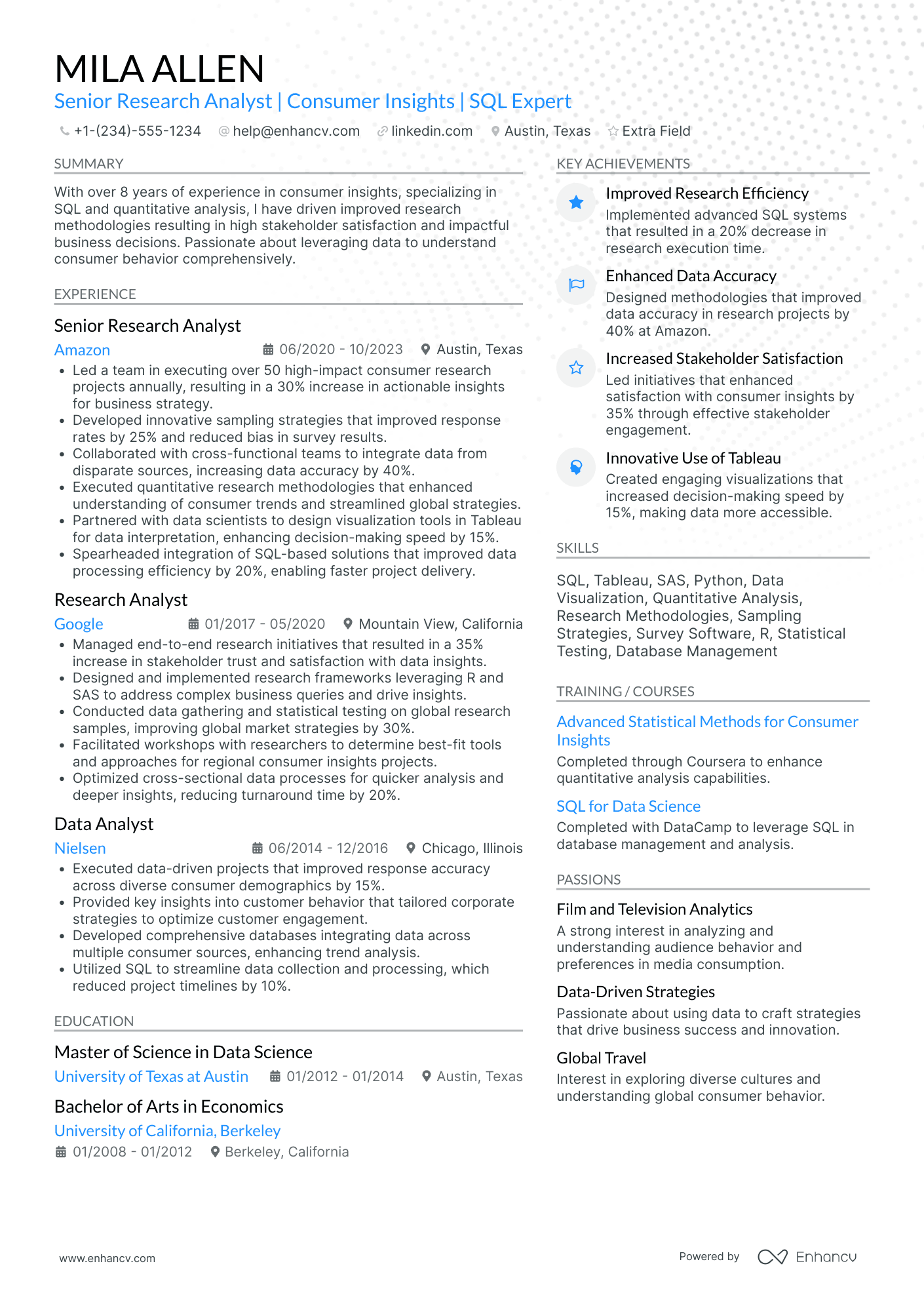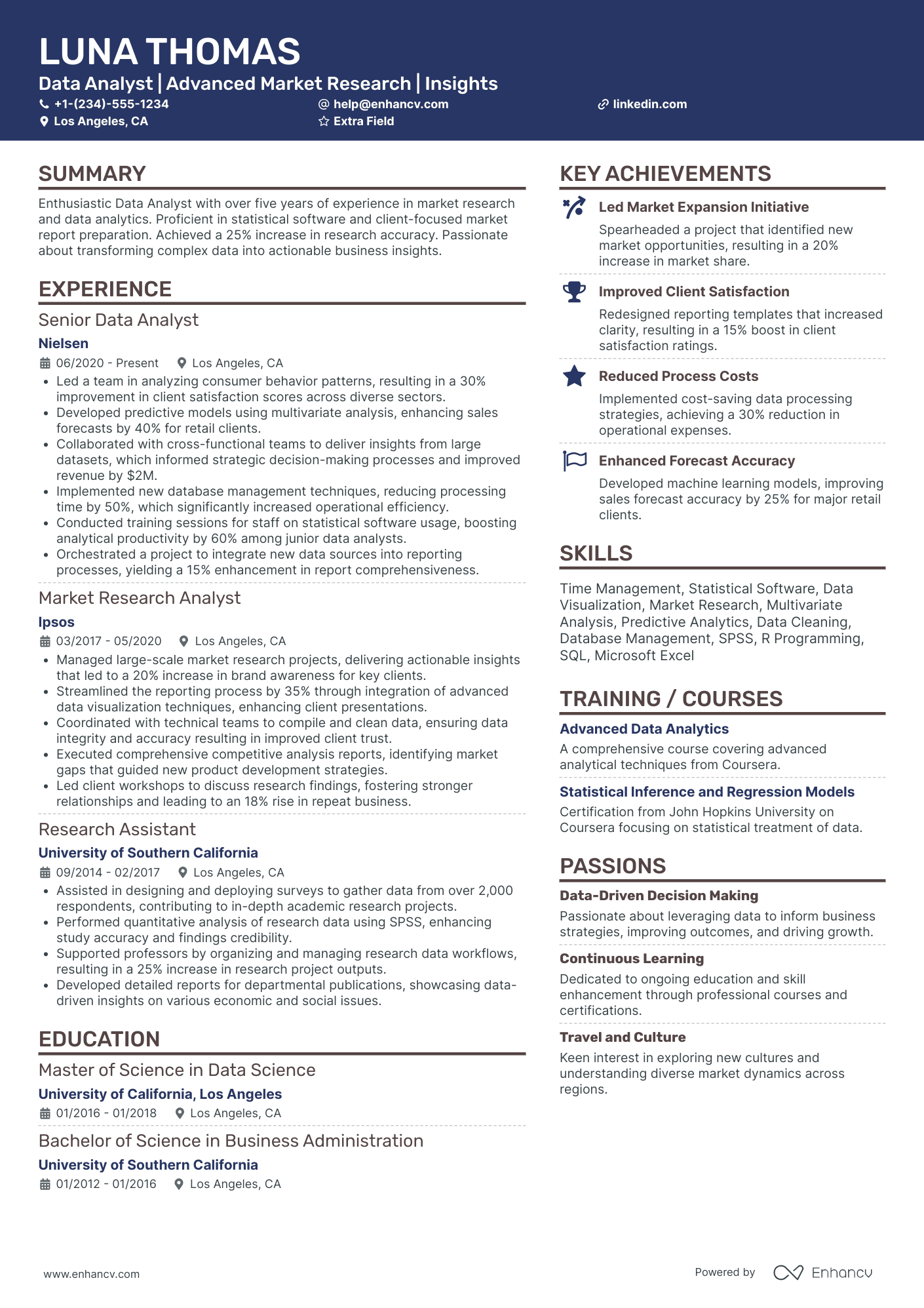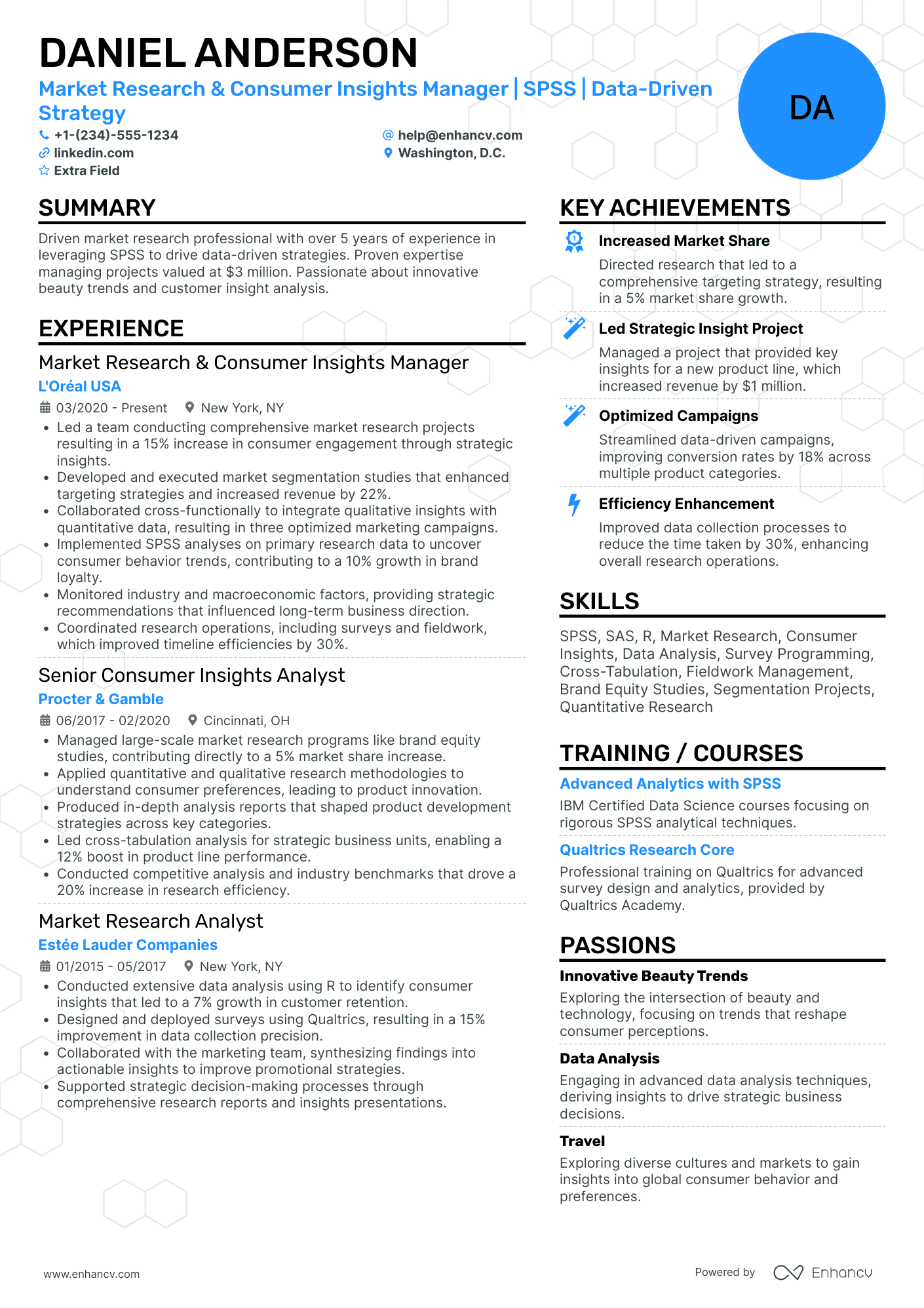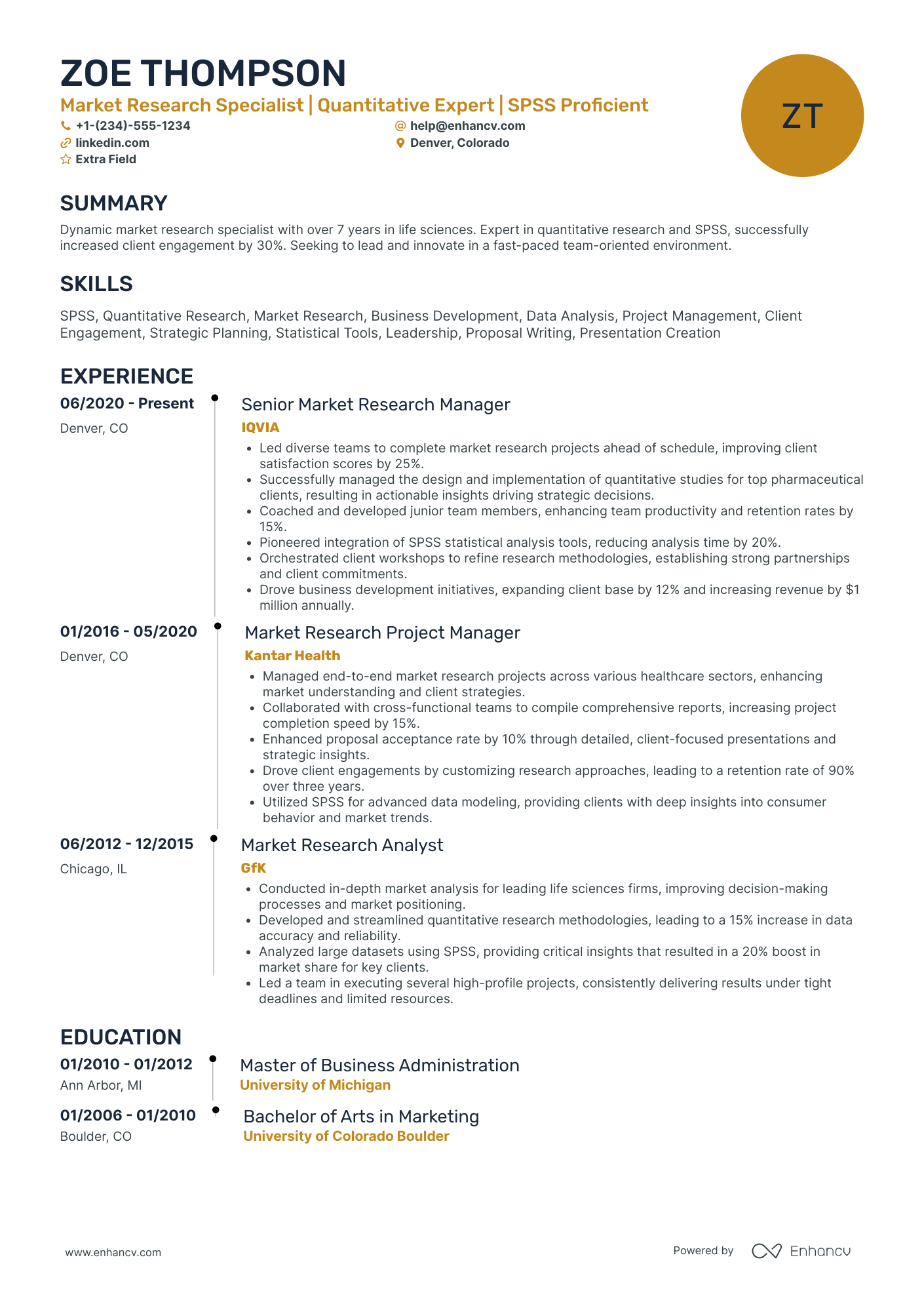Your superpowers can compress dense reports into insightful bite-sized data.
Crafting your market research Analyst resume for this job should be no different!
Yet, another application comes and goes with no callbacks.
You thought you got it all in the bag - your statistical insights, data evaluation principles and implementation skills have no match.
But, what really happened is that the recruiter never got a chance to read through your resume.
They saw the same overused duty list with no actual numbers and results.
Our market research Analyst resume guide is a good place to redo an unsuccessful resume.
It will take you roughly 10 minutes to know what you’re missing out.
What our market research resume guide will teach you
- Which are the 6 specific resume sections for a market researcher resume.
- 9 market researcher resume examples that will underline role-specific skills and traits that recruiters look for.
- How to showcase your education, experience, certifications, and achievements relevant to the industry.
- How to highlight your competence relevant to market research even if you don’t have related experience yet.
- How to layout and optimize your resume sections so that recruiters can pick up the important things.
How to write a market research resume
You’re a market research Analyst.
At the end of the day, how you handle, collect, crunch and interpret large data and numbers is what’s going to wow the recruiters.
So, don’t waste your chance to show those skills by using a premade template you found by doing a 5-second Google search.
If anything, it undermines your research proficiency.
Focus instead on bringing the maximum value in the following important market research resume sections.
these 6 market research analyst resume sections make the difference
- Header
- Professional summary
- Scope of experience (coupled with numbers and results)
- Relevant skills
- Certifications
- Education section
What recruiters pay attention to in your market research resume
- Experience in SWOT analysis
- Communication and presentation skills
- Knowledge in data collection methods
- Ability to interpret data and translate them into actionable items.
What should go in a market research analyst resume header
Whoever is in charge of checking your resume, they will have to go through your header.
That’s why it's important to get it done right.
To fully leverage on the power of a concise resume header, you mustn’t omit the following information below under any circumstances from your market research resume.
- Your name
- Your location (City + State/Country is enough)
- Your current job profile
- Contact data (professional email & a phone number)
- Related links (personal website/LinkedIn profile)
Below you will see two examples of resume headers - one of them taking the upper hand on the other.
2 market research Resume Header Samples
You see, just by including a LinkedIn profile and at least one more contact entry, this candidate takes the lead over who gets the job.
Don’t miss your chance by dropping off relevant links like your LinkedIn profile or portfolio.
Overlooking your market research analyst resume summary would be a mistake - here’s why
Take a pause.
Go back to the job description, and read it through.
You’ll soon start seeing a pattern:
- Collecting data on consumers and competitors.
- Consolidate information and turn them into actionable items, reports, and presentations.
- Analysis of statistical data using traditional and modern methods.
- Interpretation of data and making recommendations.
- Remaining fully on-loop with current market trends to implement the most relevant and effective practices.
- Thorough understanding of SWOT analysis (strengths, weaknesses, opportunities and threats analysis)
- Evaluate methodology and data to ensure accuracy of releases.
Now, don’t make the mistake by going all blindly and write the first thing that comes to mind in your resume.
Optimize your resume summary and objective for ATS
Drop your resume here or choose a file.
PDF & DOCX only. Max 2MB file size.
2 market research resume summary examples
This summary attempts to make a statement but falls flat at the end. It won’t impress the recruitment manager because:
- It didn’t feature any of the specific skills that the candidate possess.
- Claim is not backed by simple data.
- Generic description that doesn’t resonate the candidate’s actual competence.
Frankly, it doesn’t look that the candidate made any effort to understand the job description.
Let’s do it right.
Summary statements should create a lasting impact with minimal word count.
The best way to do that is by focusing on the professional milestones you’ve achieved.
Recruiters can, at a certain extent, estimate your competence without having to go through your entire resume.
Pro tip
Market research is a job that deals with numbers. In this industry, real numbers will make a great impact.
How to make an effective market research resume experience section
Top market research analysts don’t strictly come with marketing-only background.
If you performed quantitative expertise in statistical data analysis in a related field, you may very well be ahead of other candidates.
Thus, candidates in the following occupation would prove to be strong prospects for the jobs.
- Economists
- Mathematicians and statisticians
- Public research analysts
- Survey researchers
- Cost estimators
- Advertising, promotions, and marketing managers
The question is, what goes in your experience bullet points? Two words: numbers and results.
Include figures and estimates that could measure the amount of success you’ve had.
Let’s get you started with a few cases:
- Did you gather consumer data from 5 different markets and presented 100+ report pages and briefs to C-level?
- Have you identified a pattern in consumer behavior that saved your company $100K a year?
- Did you identified potential new markets for your company, leading to an MRR increase of 15%?
When it comes to a job that entails in-depth analysis and mental gymnastics like market research Analyst, numbers can quantify your competence.
2 market research analyst resume experience examples.
- •Conducted primary market research through in-person interviews
- •Designed and organized a CRM training curriculum for the management team and the employees
- •Conducted in-depth analyses of competitors
- •Made changes to existing Input module
Yes, we agree with you.
It looks comprehensive and provides a thorough breakdown of the candidate’s responsibilities.
But, does it make an impact? We beg to differ.
If anything, it ends up sounding like the rest of the candidates vying for the position.
- •Conducted primary market research through in-person interviews with over 50 wholesale and 20 retail stores
- •Increased customer satisfaction from 80% to 95%; designed and organized a CRM training curriculum for the management team and 20 customer service employees by conceptualizing and renovating existing CRM program
- •Conducted in-depth analyses of competitors and +20 end-markets
- •Made changes to existing Input module which saved close to 2 days of manual work
Real numbers can quantify the candidate’s expertise and competence in the role.
In market research, numbers count - your resume should show that too!
Student or entry-level? here are tips for your market research analyst resume
Or do you want to kickstart a career in market research, for a change?
Here’s what you should keep in mind:
- Identify the must-have skills and experience for the market research job you’re eyeing. Is it designed for someone with experience in survey designs? Data analysis? Data collection method? Interpretation and intervention?
- You may not have held the exact market research Analyst position, but chances are, you might have performed relevant tasks in the past. Occupations in the field of Statistics, Marketing, Economics, etc may have similar responsibilities that demonstrate those.
- Find the right experience in your previous work and highlight it in your resume. Break it down precisely in the same language as the market research Analyst job description used.
If you’re making an entry-level resume, your job experience may not hold up on its own. Your skills section will be equally as important.
Market research skills on your resume - best practices
Ultimately, your skills section should match the exact requirement of the job, as stated in the job description.
Market research utilizes plenty of tools under its sleeves, due to the fact that the job deals with a lot of data.
For jobs like market research, relevant skills come in two categories: the technical skills and soft skills.
Mixing both technical and soft skills in a single section will make it harder to read for recruiters.
Showing your tech skills on the resume properly
This is a very straightforward layout that features a candidate’s market research technical skills, and it should be for one good reason - it’s easy to scan.
Other than showing how equipped you are for the job, including job specific technical skills may get you past the automated gatekeeper of recruiters (ATS for short).
Here's a list of 15 important tech skills for market research analyst resumes
- Tableau
- Simplymeasured
- SurveyMonkey
- Typeform
- Excel
- MatLab
- SPSS - by IBM
- XLSTAT
- Minitab
- Qlik Sense
- Stata
- OriginPro
- Omnia Pricewatch
- Nfield
- MySurveyLab
How to build your soft skills resume section
Soft skills isn’t just about being able to “work under pressure” or being a “team player.”
Those generic soft skills may work for the average 9-5 jobs, but market research isn’t just any kind of job.
Here, recruiters may not take you seriously unless you embed some practical examples you’ve used those skills to complete a task.
9 market research analyst soft skills
- Critical thinking
- Psychology
- Attention to detail
- Methodical approach to work
- Presentation
- Awareness
- Team management
- Collaboration
- Cultural trends
Should i put an education section in my resume?
Market research Analyst job need at least a bachelor’s degree. Add an education section to your resume and compliment it with some coursework, volunteering or any related projects you have been a part of, while studying.
There is no specific degree to be qualified for this profession, but candidates with the following degrees find success in this field easier:
- Statistics
- Math
- Economics
- Computer Science
- Social Sciences
- Communications
High caliber research positions will require a master's degree in the above field. Proven expertise in math and analytical skills are also essential.
If you have an unrelated degree, you can simply mention it but you don’t necessarily have to provide details.
Having a certificate in such cases, will matter more.
How to include certifications on your market research resume
Most of the time a certification is voluntary, and many professionals find their way to this field with degree not directly related to market research.
However, if you want to have a solid proof of your professional competency in this field, pursuing one will be extremely beneficial for your credentials.
Most often, recruiters know the relevance, value, and reputation of these certifications to market research, so you don’t have to provide too many details.
However, make sure to include the name, the issuing institution, as well as the year you took it.
Top 5 market research analyst resume certifications
- Professional Researcher Certification (PRC)
- Certified Research Analyst (CRA)
- Certified Research Expert (CRE) - for market researchers with 1 year experience.
- Certified Research Professional (CRP)- for market researchers holding leadership and management roles, with minimum 3 years experience.
- Graduate Certificate in Marketing Analytics and market research
- Post Graduate Certificate Program in market research And Data Analytics
- Certificate in Market and Social Research Practice
What are the key tricks to write a perfect market research resume
To wrap it up, these are the main points to remember when writing a market research resume:
- When writing a summary, focus on the professional milestones you’ve achieved and the main expertise and methodologies that propelled you to reach it.
- Numbers can speak volumes about your competence - write them down!
- Your skills should match the exact requirement of the job, as stated in the job description.
- Mixing both technical and soft skills in a single section will make it harder to read for recruiters.
- Generic soft skills are useless. Market research need individuals who are great thinkers - your soft skills should show that.
- You don't need a degree in market research, but more lucrative market research jobs will need one or a certification.
Market Research resume examples
By Experience
By Role
